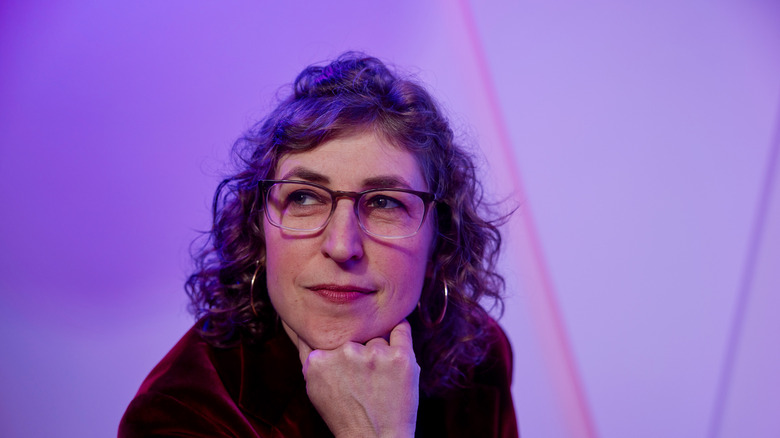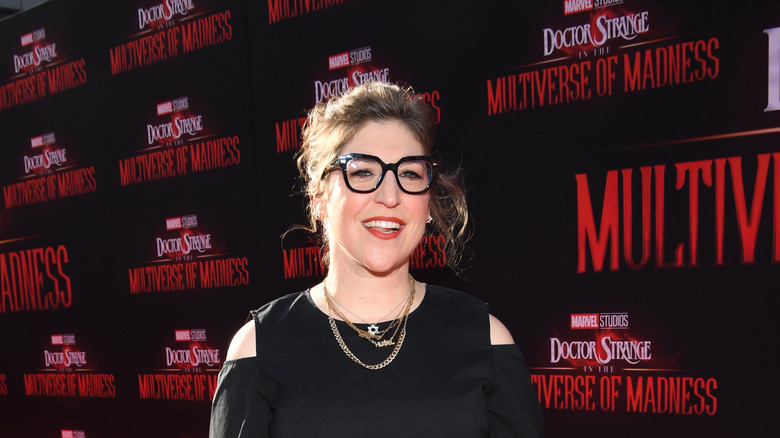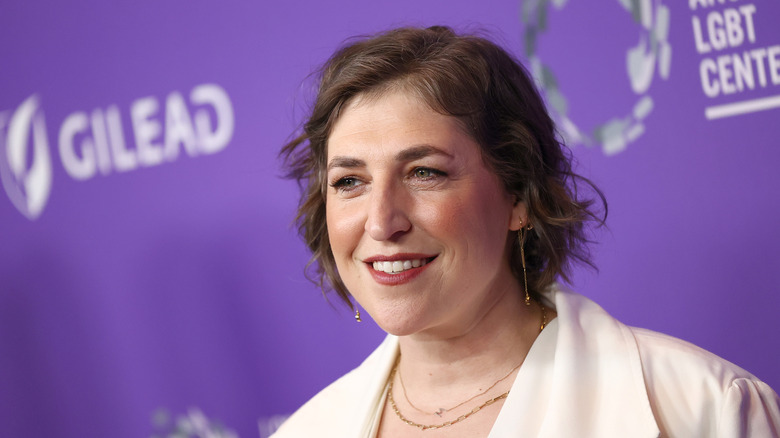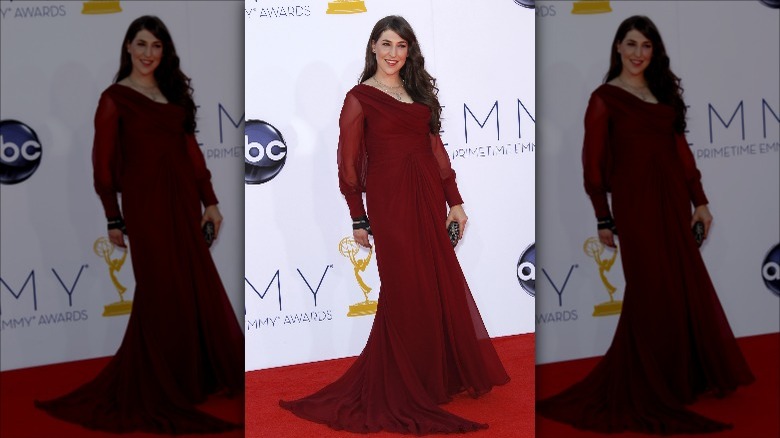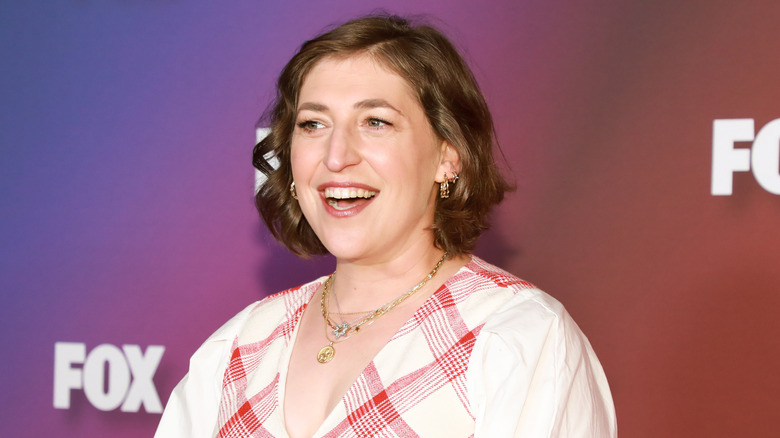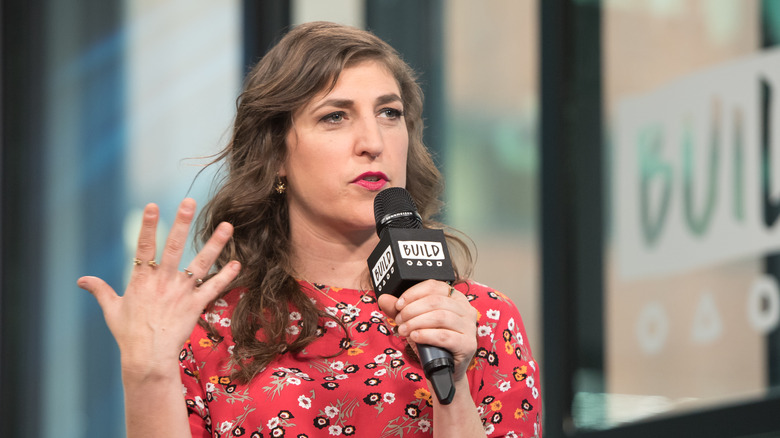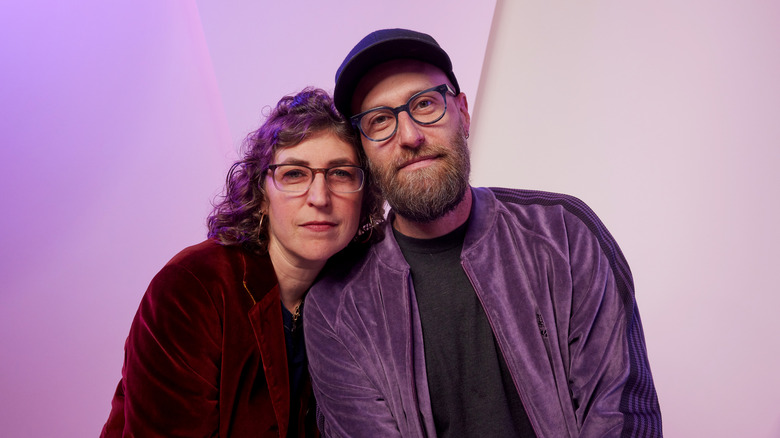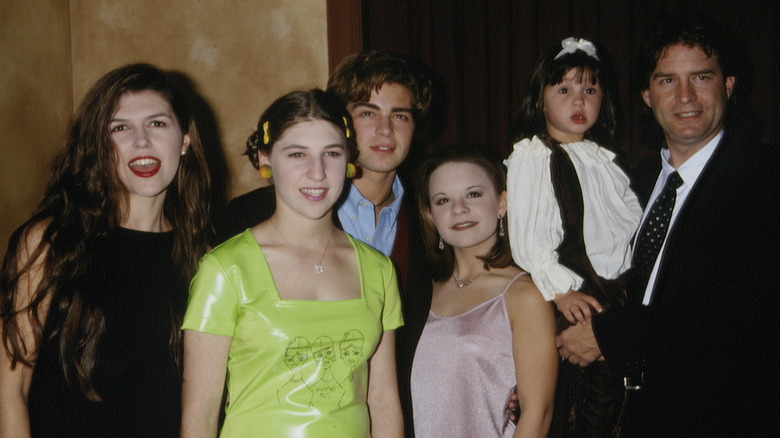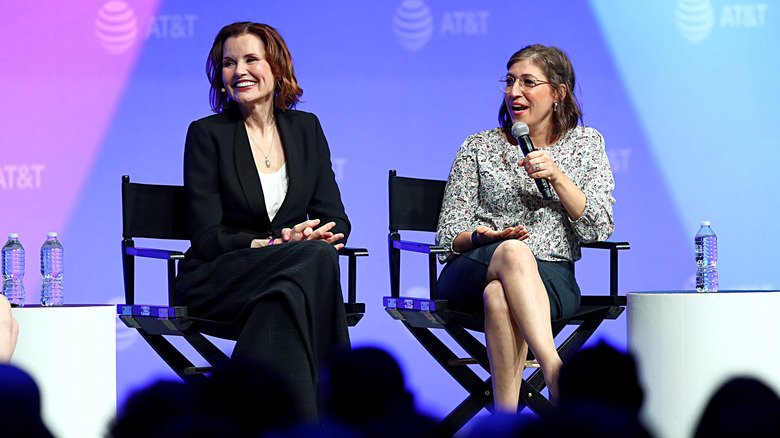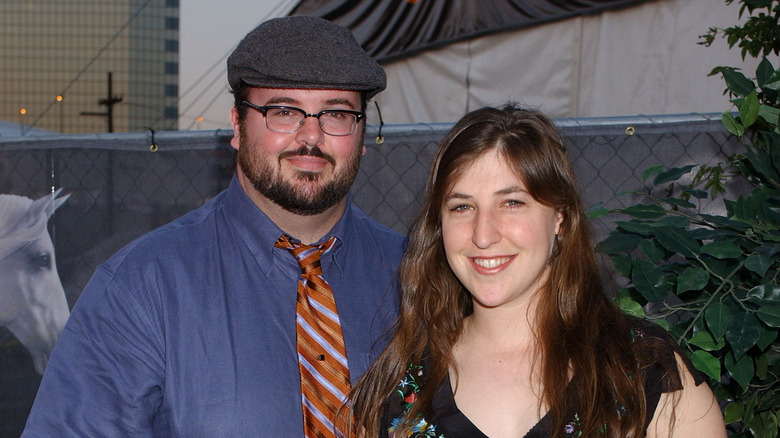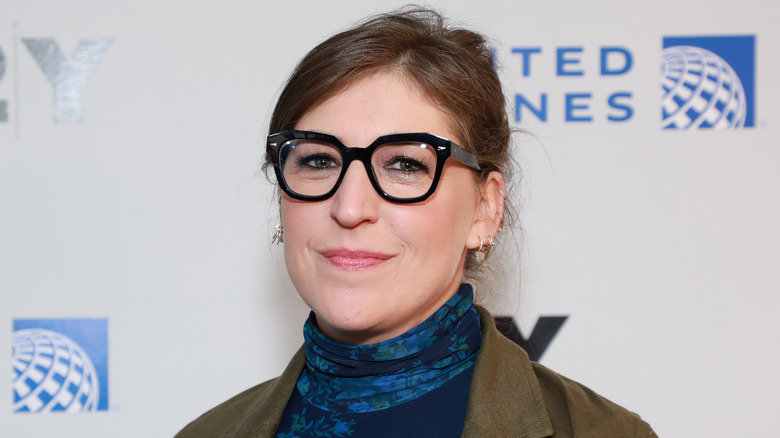The Tragedy Of Mayim Bialik Explained
Celebrity status always seems like such an enviable thing. After all, it sure sounds like the epitome of fame, success, money, and the works all rolled into one. The kind of wealth that could buy you an island — or maybe a big mansion in the heart of Beverly Hills — and worldwide recognition, with people all over recognizing and loving you for your work. Sure has the makings of a real Hollywood giant's dream, doesn't it? Well, here's the thing: That image sort of is just a dream — a fantasy that's fun to think about, but pretty far off from the realities of celebrity status.
Of course, all celebrities and public personalities have their own path to and relationship with fame, but thinking that their lives are automatically divorced from any sort of hardship can be something of a harsh generalization. Take Mayim Bialik, for example, an accomplished actor known for her roles on "Blossom," "The Big Bang Theory," and recently as the host of "Jeopardy!" all on top of being a real-life neuroscientist (doctorate and all). She's also had her fair share of hardships, much the same as anyone else, and she's recently taken to speaking out about them. Notably, she advocates adamantly for greater mental health awareness — she's even started a whole podcast on that very topic! Here's a quick rundown of some of tragic things she's discussed about her life.
She's talked about her mental health struggles
Mental health advocacy has become a much bigger topic in recent times, and Mayim Bialik has shared her stories of mental health struggles — particularly those that she experienced when she was younger. In an interview with Kara Mayer Robinson, the actress confessed that she didn't start seeing a therapist until her late teens, though she knew in hindsight that the signs of issues had been there quite a bit longer. But given the times, mental health awareness just wasn't a thing that people knew about. She specifically mentioned that upon getting her first period, her mood began fluctuating to the point that it gave her legitimate panic attacks. In her own words, "Not the kind of panic attacks ... that a lot of people talk about like 'OMG, I had a panic attack because he was late' ... it feels like a heart attack." At 16, she didn't know what a panic attack felt like, nor what a heart attack felt like — and wasn't really given the help she needed.
On top of that, she didn't exactly know what kind of help she even needed. In a separate video (via People), she further explained, "I had this notion when I was younger that if something didn't work once, or if a therapist didn't work, or if a medication didn't work, that nothing would ever work." That said, she added a message of hope, saying she wanted to tell her younger self that things would work out, even if not immediately.
She's been diagnosed with OCD
There are several different avenues Mayim Bialik has used to discuss mental health advocacy and awareness, including her own podcast, "Mayim Bialik's Breakdown." In one episode (via Instagram), she spoke about OCD (obsessive-compulsive disorder) and dispelled a number of the myths surrounding the mental illness. After all, it's something that she deals with, and has dealt with since she was fairly young.
She put it very clearly that OCD isn't some general term meant for light jokes about vaguely quirky or strict behaviors. Rather, it's a much more serious — and potentially severe — condition that is effectively a cycle of anxiety and seeking out ways to reduce that anxiety. As she puts it, "The obsession is the internalizing aspect, and the compulsion is the externalizing aspect" — a succinct and accurate definition that plenty of others who experience OCD were grateful to hear.
In terms of her own experiences, she said in a video for the Child Mind Institute, "One of the things that made my life really difficult was trying new things, and it's still really hard for me." While many people probably don't think that much of trying out a new hairstyle, she explained that cutting her hair short was actually a really big deal for her and a pretty hard decision to make. As for what helped her go through with it? People being there to support her, which helped her remember an important lesson: "Change can be good, and even when it's scary, it's okay."
A car accident brought traumas to the surface
Back in 2012, Mayim Bialik was nominated for her first Emmy for her success in "The Big Bang Theory" — and was also involved in a pretty serious car crash that left one of her hands badly injured. In an interview with Vanity Fair, she treated the incident with relative levity, talking about jokes she made with her publicist and voicing her gratitude for the love she received from both friends and fans. She didn't go into much further detail about it at the time, saying, "It's also important to me to keep some of my recovery private as well."
In her talks with Kara Mayer Robinson eight years after the fact, she spoke in further detail about the longer-term effects of that accident. "After that, a tremendous amount of, literally, trauma stuff surfaced," she explained. "I became sound sensitive, I became touch [sensitive], and I was like, 'What is happening?'" A bunch of physical sensations — sounds, lights, and the like — suddenly became highly amplified for her, and she couldn't understand why, as it was something she'd never had to deal with in the past.
All that said, though, she spoke about her experiences openly and also mentioned that it's something she now shares with her son. Both of them are sensitive to physical sensations, and they help each other out. For example, they cover each others' ears when a fire truck passes by.
Her sensitivity has been both a blessing and a curse
In her interview with Kara Mayer Robinson, Mayim Bialik spoke about how she's a highly sensitive person, both in terms of physical sensations and when it comes to emotional situations. And she jokingly said that it feels like a superpower sometimes — people in her life have said that she's highly empathetic and scarily good at understanding emotions. But she also explained that it's caused her hardships in the past. In talking to the Daily Beast after her directorial debut in 2022, Bialik summed up her thoughts about her upbringing by saying, "I think many of us were parented the way that I was — with a lot of love and a handful of confusion."
In speaking with Robinson, she further explained that her emotional sensitivity didn't always mesh well with growing up in an immigrant household: "You get a lot of sticking together and ... 'let's keep it all in the tribe' and 'no one needs to know what's going on' ... I happened to be the kind of kid that was deeply affected by that kind of confusion and tension." At times throughout her life, she said people even told her, "'You're too sensitive, you're too emotional, calm down' ... which just made it worse." She further added that she now understands that her emotions are simply always high — she constantly feels emotional connections, which Robinson said could both be a good and bad thing at the same time.
The effects of intergenerational trauma
While Mayim Bialik might be best known for her acting roles and has also become a fairly well-known advocate of mental health awareness, it's also worth noting that she comes from a Jewish immigrant family, and that upbringing has also affected who she is. More specifically, while discussing the long-term effects of trauma on the podcast "Pretty Messed Up," she went into the effects that intergenerational trauma had on her family, given that her grandparents had immigrated from Poland after escaping pogroms.
According to her, there were plenty of good things about her upbringing, and she was raised with a lot of love and surrounded by creativity. But traumas like those caused by the pogroms don't just disappear. As she put it, "My parents struggled a lot, and it weighs on you, especially as a child." There were plenty of behaviors that would definitely be considered problematic by today's standards, and that made her into "the child that would fix everything." She took on a lot of that stress by herself and felt she couldn't talk to anyone or ask for help, because that's just not what the family did.
What's more, all of that stress just felt normal to her, which actually made things harder — not easier — when she moved out for college. Rather than feeling a weight lift from her shoulders, Bialik felt like a core part of her identity had just disappeared. She even started wondering whether she was actually good enough for anything else.
She's opened up about her eating disorder
Mayim Bialik has used her podcast to both talk about her own experiences and also speak with plenty of peers and experts to bring more awareness to mental health. In an episode that's since become one of her personal favorites, she'd initially planned to let her guest do more of the talking, but in a twist that surprised everyone present (herself, her partner, and her guest), she publicly opened up for the first time about her experience with eating disorders.
In the episode (via USA Daily), Bialik spoke to activist Glennon Doyle and admitted that she'd never really talked about it. "People are like, 'Well, why are you so overweight?'" she revealed. "Well, because I'm a compulsive overeater in addition to being an anorexic and restrictor ... [I'm] eating so I don't have to feel anything." On top of that, she spoke about Hollywood's unrealistic beauty standards and the stress she'd felt trying to meet those standards — a stress that was likely amplified by people in the past commenting that she was too heavy for a specific role. Her goal is to stop caring so deeply about what Hollywood thinks and instead stand by what she thinks about how she looks.
Afterward, she explained to People that the whole thing was completely unplanned, crediting Doyle with giving her a safe space to be so vulnerable. According to Bialik: "If [Doyle] can be brave and be so helpful to people, maybe I can try and be brave too."
The ugly realities of casting in the 1980s
In the current day and age, movie and TV casting is typically more sensitive, often looking toward more diverse and genuine casts. But the 1980s and 1990s weren't quite the same as the 2020s when it came to the social landscape. Namely, Mayim Bialik explained to EDGE Magazine that early in her acting career (around the mid-1980s) the push was for actors to look "All-American." As she put it, "I didn't look All-American. I've always had prominent features and I've always looked ethnic, so I ended up doing a lot of character roles." Of course, Bialik is now known for her role on "Blossom," but that doesn't mean there weren't negative experiences. On her podcast (via The U.S. Sun), she explained that she was usually typecast as, essentially, the weird friend, and being the lead didn't keep her safe from baseless hate: "People made horrible comments about my appearance, which never left me, since I've been 14 years old."
Then, there was also a controversial SNL skit in 1994 in which Melanie Hutsell was forced to wear a prosthetic nose to portray Bialik's character. Bialik commented on the whole incident many years later, mentioning her own discomfort while also wondering how it must have felt for the Jewish girls who had told her they felt proud of their heritage after seeing her on TV. (For what it's worth, though, Hutsell never felt comfortable with the decision, and the two actresses hold no grudges against each other.)
Going to college wasn't exactly easy
With all the fun that comes from celebrity — and sometimes heaps of money as well — it's really easy for anyone outside of the entertainment industry to imagine that landing a role in a popular TV show could have you set for life. But for Mayim Bialik, that wasn't the case. After all, she went to college after her show was over, leaving acting to pursue her doctorate in neuroscience instead. As she told Publishers Weekly, that choice partly came from being fed up with the public eye — she wanted out of the spotlight. "It was not fulfilling for me anymore at that stage in my life," she said of the entertainment industry. It just didn't line up with her personal priorities.
But regardless of that, it didn't make the transition into college easy. For one, "Blossom" was still a big show, even if it wasn't necessarily the most popular of its time. In other words, she was really well known, whether she wanted to be or not. On top of that, she added, "I was not a natural science student ... It took some time and a lot of hard work for me to catch up." Then, there's the notion of wealthy sitcom stars to dispel, at least when it comes to Bialik. Popular as "Blossom" was, she wasn't paid a huge amount (especially compared to current-day sitcom stars) and had to work and budget all through college, just the same as plenty of other students.
She got divorced in 2012
In Mayim Bialik's interview with Kara Mayer Robinson, the pair had a whole discussion regarding the patriarchy, traditional gender roles, and how both of those continue to affect people to this day. And the whole conversation stemmed, in part, from Bialik's divorce from Michael Stone back in 2012.
As the story goes, Bialik and Stone married in 2003 and had two sons, but in 2012, she released a statement on her blog that they would divorce due to "irreconcilable differences." Nonetheless, she said their two sons would be ensured the smoothest transition possible, and that she and Stone would do everything they could to continue giving them a loving childhood. Since then, both of them have kept that promise, even if the exact circumstances aren't always easy. In 2018, she wrote on her Grok Nation blog about attending Thanksgiving with not just her ex-husband but also his new girlfriend and her family — something that made her understandably nervous and also made her question her future regarding marriage. (She went through with it for her kids, and fortunately, it all went well.)
More generally, she and Stone have been co-parenting their kids, and she told Robinson that she was proud of how hard they'd worked at their relationship — even if he still annoys her sometimes.
She's taken some pretty controversial stances
When Mayim Bialik was announced as one of the new hosts of "Jeopardy!" there was plenty of controversy. Many people online questioned the decision and pointed to her strangely storied past with controversial opinions.Perhaps most notable are her stances on vaccines and parenting styles. She's been openly critical of vaccines since 2009, admitting that her family didn't do vaccines, though her opinions changed ever so slightly when 2020 rolled around. Even then, she said in a YouTube video they would only receive the COVID-19 and flu shot vaccines and said there are "way too many vaccines in this country."
Where parenting styles are concerned, she's been a vocal proponent of attachment parenting, a practice that emphasizes close bonds between parents and their kids. However, some of the specific practices are considered high risk by the American Academy of Pediatrics, the philosophy can create dangerous levels of competition between parents, and the entire idea was founded by a doctor with markedly anti-feminist views. Not a great look.
There were several other incidents involving supplements based on shoddy science and statements that were interpreted as victim blaming, but most recent was her stance on the Israel-Hamas conflict, in which she openly supported Israel. Backlash came from all sides — including from other Jewish people — accusing her of making sweeping generalizations while also overlooking an effective genocide.
If you or someone you know needs help with mental health, please contact the Crisis Text Line by texting HOME to 741741, call the National Alliance on Mental Illness helpline at 1-800-950-NAMI (6264), or visit the National Institute of Mental Health website.
